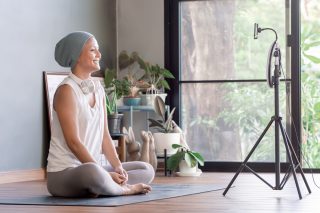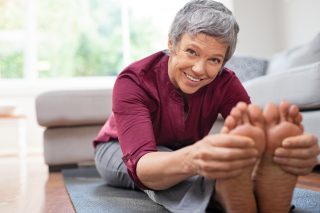With COVID-19 still on the loose, everyone is on high alert at the moment taking steps to look after their health. It’s a good reminder that self-care isn’t just all about yoga and face scrubs.
Self-care is all about paving the way for a future brimming with health and vitality… And it’s never too late to start taking care of number one. With a few tweaks, you can harness your body’s potential at every age to keep you in good shape for decades to come. Read on for expert advice on how to feel fit and healthy through the ages.
Self-Care Tips For Your 20s
READY, SET, GO!
Good food, regular physical activity, plenty of sleep, and safe sex.
This is the age when burning the candle at both ends doesn’t knock you out for days. But don’t let all that youth, energy, and vitality go to waste. Use it to build a strong foundation to carry you through life.
Embrace real food
It’s easy to rely on processed convenience foods but even at this age, you’ll soon notice less energy and enthusiasm if your diet focuses on nutrient-deficient foods, especially at this time of the year when our immune system can suffer from our body not getting the nutrients it needs.
If you need any ideas, social media is literally bursting with inspo to be fit and healthy. Follow a few foodie and recipe vlogs, and be inspired to cook your own food using fresh ingredients.
Start moving
Now’s the time to explore the fitness options available to you, find what works, and stick to it.

mimagephotography/shutterstock
MYTH BUSTER: Pelvic floor exercises
MYTH: Only women who suffer from bladder leakage need to do pelvic floor exercises
FACT: Everyone, including women who haven’t had a baby should be doing pelvic floor exercises. As women age, the pelvic floor muscles – the ‘sling’ of muscles that support the bladder, bowel, and uterus – can stretch and weaken.
Frequently lifting weights at the gym may contribute to this weakening. Spending a few minutes a day exercising your pelvic floor will mean you’re much less likely to experience problems later in life. Try the Continence Foundation of Australia’s Pelvic Floor First app – available free from the App Store and Google Play.
Regular physical activity can help ward off excess kilos, diseases, bone loss, stress, depression, and anxiety now and down the track. At the moment, while we are all avoiding crowded gym classes and public spaces, you can still find some workouts that can be done from home.
Put out the fire
Aside from yellowing teeth and bad breath, smoking also increases your future risk of menstrual and fertility problems, osteoporosis, cancer, heart disease, and stroke. It can also increase your susceptibility to infections such as pneumonia and influenza, and lower the levels of protective antioxidants (such as vitamin C) in the blood.
Lay the foundations
Your bone density has nearly reached its peak by this age. The sooner you start protecting your bones, the more likely you are to have healthy, strong bones for life.
The combination of eating a diet rich in calcium (1000 mg daily), ensuring you are getting enough sunlight to make vitamin D, and exercising are three key factors that can help build and maintain strong, healthy bones.
Protect your skin
It’s almost impossible to completely escape skin damage as we age. But you can delay the onset of wrinkles, sagging skin, and sun damage by applying sunscreen to your face and hands.
Squeeze in sleep
Sticking to a balanced sleep-wake cycle might not be top of your list at this age, but it’s important for your mental and physical wellbeing.
Studies show that people who don’t get enough quality sleep are more likely to get sick after being exposed to a virus, with lack of sleep also affecting recovery time if you do get sick. Try to go to bed at the same time each night to keep your body clock happy and let in natural light first thing in the morning.
Stay safe
![negotiate your teeth [longevity live]](https://longevitylive.com/wp-content/uploads/2020/02/woman-sitting-and-smiling-1858175-213x320.jpg)
negotiate your teeth
Women in their 20s are at a higher risk of getting sexually transmitted infections (STIS). Brisbane gynecologist Dr. Devini Ameratunga says, “STIs can cause chronic pelvic pain, blocked tubes, and infertility, so it’s important to consider this in your 20s to prevent problems later on.”
How to eat
Accredited practising dietitian Bronwen Greenfield says:
>> This is the age to focus on creating healthy habits to set you up for life. A simple strategy is consuming two serves of fruit and at least five serves of vegetables a day. This will ensure it’s a habit by the time you reach your 30s.
>> Iron deficiency is common at this age, so it’s important to ensure that you’re eating enough iron-rich foods such as lean meats or non-animal sources such as legumes, whole grains, and leafy greens.
>> Keep in mind that plant-based sources of iron are not as well absorbed, so pair these foods with a source of vitamin C such as citrus fruits, tomato, or capsicum, and consume any ‘iron blockers’ like coffee separately to help increase the amount of iron absorbed.
HEALTH CHECK ALERT
CERVICAL SCREEN
All women over 25 should have a cervical screening test every five years. This applies even if you’re not having regular sex, regardless of whether your sexual partners are male or female, and whether you’ve had the HPV vaccine or not.
As you enter your third decade, life can become more demanding. Chances are you’re likely going to be juggling family and a career. It’s important to find balance and make time for healthy habits to safeguard your health.
Self-Care During Your 30s
GET THAT GLOW!
If you practice good self-care in your 20s, you’ll land in your 30s with a bang. If not, it’s never too late to turn over a new leaf and make those healthy habits stick.
Working out
Your body is still strong, but your metabolism can slip into a lower gear. So now is the time to work on losing excess weight if needed. Exercising a regular part of your day and working on maintaining muscle strength now will mean a stronger body in your 40s and 50s when muscle strength can start to decline.
Pay particular attention to your knees, which need all the help they can get as you age – scaffold them with strong quadriceps and calf muscles.
Fertile time
There is a big gap between the ideal biological age and the ideal social age of conception, according to Monash University’s Dr. Karin Hammarberg. The easiest time to get pregnant is before 30.
As you get older, it will take longer to conceive, and the chance of having a baby decreases. A healthy lifestyle boosts your chances of a successful pregnancy – not smoking, taking care of your oral health, avoiding or limiting alcohol and caffeine, and protecting yourself from environmental chemicals.
Try the Healthy Conception Tool at YourFertility.org.au to help you pinpoint everyday factors that may increase your chances of becoming pregnant.

stockfour/shutterstock
Tackle Stress
Stress is often on the increase at this stage of life, and those everyday micro stressors can add up and take their toll. There’s no better time to work on keeping a lid on stress because over time it can lower immunity, disrupt digestion and hormones, and trigger disease-causing inflammation.
The most effective stress-buster is finding a healthy work-life balance and introducing a little ‘me-time’ into each day. For at least 15 minutes every day, stop everything and read a book, listen to music, have a bath, meditate, go for a walk, or whatever you find comforting and soothing. Just be sure it doesn’t involve your computer, phone, or reading the latest news headlines.
Know your health history
Taking responsibility for your own health is a big step towards self-care. Start by asking close family members about any health issues and record their responses, then build your own records from that. Record your medical history to date, any risk factors, and medications you’re taking.
This system will help you and your doctor understand any problems that come up in the future, prevent errors in treatment and diagnosis, and help decide what preventative tests you may need.
HOW TO EAT…
Dietitian Bronwen Greenfield said:
>> In many parts of the world it’s becoming more common for women to have a baby in their 30s, so if you are looking to conceive, good nutrition is a must for increasing fertility at this age.
Ensuring that you’re supplementing with folate and eating plenty of foods rich in iron, zinc, and antioxidants is a must. It’s also important to avoid alcohol and high doses of caffeine if you are trying to conceive.
>> Your 30s is also the age at which peak muscle mass is achieved, so ensure that you’re continuing with strength training and eating adequate protein and carbohydrates to fuel and replenish muscle stores.
Keep breathing
You’d be surprised how many of us don’t breathe in a healthy way – either holding our breath or shallow breathing – and the negative effects are cumulative, so it’s worth paying attention to it now. Place coloured sticky dots around your house as a reminder to breathe. You might be surprised how often you hold your breath.

tache/shutterstock
Boost the benefits by stopping to breathe from your diaphragm a few times a day, particularly when you’re feeling tired: put your hand over your belly button and, as you inhale, focus on making your stomach and chest rise. This will automatically expand your lower lungs so you take in more air with each breath. It’s an effective fatigue buster, too!
HEALTH CHECK ALERT
Work out your health numbers
Your 30s is a good time to start monitoring blood pressure, cholesterol, and blood sugar numbers. They will help to identify the need to take action to improve your heart health. High blood pressure and/or high cholesterol often have no symptoms. This means that you may not realize you have a problem until something serious happens, like a heart attack.
Have a chat with your doctor, who can organize the necessary checks and give you advice – from simple lifestyle changes to medication – to keep those key numbers at healthy levels.
As you enter your fourth decade on earth, you may start to experience some subtle mid-life changes such as having trouble sleeping or maybe you’re straining to see small text.
Self-Care Tips For Your 40s
GO FOR IT!
Treating yourself well is the best way to do damage control and your 40s is the time to clean up your act if you haven’t already.
Keep moving
As you enter your 40s, your body naturally slows down, but maintaining mobility is hugely important in reducing the rate of bone loss and strengthening the muscles around the joints. Slipping into a sedentary lifestyle can lead to stiff joints, which in turn restricts your movement.
Lifting weights at least twice a week is the answer to maintaining bone and muscle mass. Think about adding yoga to your workout routine to increase suppleness and strength, too.
Hormone hijack
Your 40s is when most women enter perimenopause, when the body reduces the amount of estrogen and eggs it produces. You may be starting to notice changes in your menstrual cycle – heavy bleeding is a common symptom of perimenopause. “There are many good options to stop heavy or painful bleeding,” says Brisbane gynecologist Dr. Ameratunga.
“You don’t need to suffer, and hormonal options are not the only solutions out there. Simple and convenient measures exist such as endometrial ablations. Discuss your symptoms with your gynecologist if your period is interfering with your daily activities.”

wavebreakmedia/shutterstock
Sleep tight
Sleep problems are common during times of hormonal change. Symptoms, particularly hot flushes and night sweats, can disturb sleep and set off insomnia. Relaxation techniques such as meditation, massage, and exercise may help.
Know your boundaries
An important – and often overlooked – part of self-care is knowing when and how to set boundaries. As life becomes more demanding and you’re bouncing between teenagers, careers, and your own parents, self-care means knowing what it takes for you to thrive and respect your own needs – whether that is more sleep, spending time with friends, or alone.
Learning to ask for support and showing self-compassion are also essential self-care strategies.
Brain drain
It’s easy to become consumed by family, careers, and mortgages but it’s important to keep having fun. These everyday stressors can contribute to cognitive decline over time, mainly due to high levels of the stress hormones circulating in the body.
The good news is that if stress is reduced, brain cells have the capacity to regenerate. So start identifying daily stressors in your life and look at ways to add more fun to your day. Also, consider some form of daily relaxation to give your brain a chance to rest and recuperate. Try The Mindfulness App, free from the App Store and Google Play.
HEALTH CHECK ALERT
LISTEN TO YOUR HEART
Early heart disease usually has no symptoms and you may not be aware that you are at risk.
So see your doctor regularly to ensure your heart is healthy and to assess your risk. Blood test results will identify whether you are high (more than 15 percent); moderate (10 to 15 percent) or low risk (less than 10 percent) of a heart attack or stroke. The Heart Foundation strongly recommends having a heart health check if you’re more than 45 years old, and over 35 years old for Aboriginal and Torres Strait Islanders.
How to eat
Dietitian Bronwen Greenfield says:
>> This is when your metabolism starts to decline, so focusing on portion control, increased protein, and high-fiber and low-Gl foods can make it easier to prevent any unwanted weight gain.

Kinga/Shutterstock
>> Eating a wide variety of fruits and vegetables to boost your antioxidant intake can help protect against the development of certain chronic diseases.
>> Your risk of developing health conditions like heart disease increases in your 40s. Chronic inflammation is also associated with the development of chronic diseases, so focusing on minimising inflammation levels through diet is really important at this age. Reducing pro-inflammatory foods, like refined carbohydrates and foods high in added sugars, saturated and trans fats, and eating more anti-inflammatory foods such as oily fish, extra virgin olive oil, avocado, nuts and seeds, plant-based foods, fermented foods, and turmeric can all contribute to reduced inflammatory markers.
Target kilos
Most women in mid-life will complain about their weight – with the average female weight gain per year being 500 grams. A drop in estrogen can cause weight to shift from your hips to your abdomen and you may need to work harder to keep the extra kilos at bay. Emotional eating can also play a part.
If any of these scenarios sound familiar, you may be an emotional eater: eating in response to feelings such as stress, boredom, or anger – all common emotions around this time of life. Talk to a therapist if you are depressed, anxious, or are having problems that make you feel out of control.
Simple truths
Dr. Amanda Sainsbury-Salis gave up on fad diets a long time ago and turned her focus to the simple concept of eating the foods she likes but only when hungry, stopping when satisfied and never depriving herself. She lost weight and has kept it off for many years. Check out amandasalis.com to find out more.
Drink more water
Your metabolism slows down in your 40s so the health benefits of staying hydrated become even more important. Water prevents dehydration, but it also increases blood circulation – two factors that can help keep cognitive decline and nerve damage at bay.
Aim for at least eight glasses of water a day. Fill up on water-rich fruits like citrus, berries, tomatoes and watermelon, and veggies, including cucumbers and leafy greens for an added, nutrient-rich boost.
Eyes have it
At around 40, presbyopia can set in, when the eyes begin to lose their ability to focus up close. You are also more likely to suffer from digital fatigue.
Remember to blink often to keep your eyes well lubricated and take regular breaks when you’re focusing close-up for long periods. Use lubricating eye drops, which may help to reduce dryness and redness. See your optometrist for regular eye tests and specific exercises to strengthen eye muscles.
Screen Queens
Screening saves lives, so have a free mammogram every two years if you’re over 40. If you’re in Australia, call BreastScreen Australia on 13 20 50 for more information.
Your 50s is the perfect time to make your health even more of a priority, and this might mean making a few tweaks to your lifestyle.

Ann Rodchua/Shutterstock
Self-Care Hacks For Your 50s
Forever young!
The 50s are the new 30s, they say, so make the most of this opportunity by upping self-care strategies and giving yourself the best chance of many more decades of good health to come.
Keep moving
Preventing injury by doing longer warm-ups, and more stretching and core exercises when working out is key. walking is a popular workout for those aged 50 and onwards, but combining it with regular strength training exercises or Pilates, at least two to three days a week, is a must at this age to maintain muscle mass and strength, and preserve bone density.
Play it safe
Older women starting a new relationship for the first time in many years may not think they’re at risk of STIs, but practicing safe sex is important at any age. if you’re starting a new relationship, you and your partner should consider having a full sexual health check-up – this can be as simple as a blood test and a urine test.
Play footsies
Dedicating a few minutes every day to your feet will help prevent common problems. Check your feet for any redness, swelling, blisters, dry patches, bumps and sores, moles and freckles, and discoloration underneath the nail.
Seek help from a health professional if you’re concerned. Be sure to keep your feet, leg muscles, and joints flexible with regular stretching. Heel pain is common at this age. It is often caused by plantar fasciitis when tissue is damaged or torn by too much pressure. Be sure to see a physiotherapist for special exercises, which help stabilize the ankle and heel.
Bone age
On average, women lose up to 10 percent of their bone mass in the first five years of menopause. the good news is that you can reduce your risk of developing osteoporosis with a few lifestyle changes such as avoiding excessive alcohol intake, not smoking as it has been associated with a higher risk of developing osteoporosis, and avoiding excessive caffeine.
Boost your mind
Learning a new language or taking on other mentally stimulating activities has been shown to strengthen brain cell networks and help preserve mental functions. the cumulative effects of common life factors like chronic illnesses or loss of loved ones can lead to depression and anxiety.
Don’t suffer in silence but rather seek help from a therapist. You can also keep up with relaxation techniques. Yoga has been shown to have a positive effect on anxiety and depression. This is largely due to deep-breathing techniques, which reduce levels of the stress hormone cortisol and slow heart rate.
Work it out
Regular exercise has many proven health benefits. It can help prevent, delay, or manage many of the most common chronic diseases – think heart disease, diabetes, osteoporosis, and obesity – that affect adults 50 and older.

Rido/Shutterstock
Health check – alert
Early detection
Some cancers can be detected at an early stage. This is when treatment is likely to be more effective. Regular self-exams and screenings for various types of cancers – such as cancer of the skin, bowel, cervix, and breast – is important. Ask your doctor about the best cancer screening schedule for you.
How to eat…
Bronwen greenfield says: Menopause is a time of rapid bone loss, so calcium needs to be increased around this age bracket. food sources of calcium include dairy foods like milk, yogurt, and cheese, as well as plant-based sources like nuts, seeds, tahini, and leafy green vegetables, our ability to absorb dietary calcium can also be enhanced by achieving adequate vitamin D levels. Hormonal changes also occur with menopause, which can lead to weight gain. at this age, requirements for grains and cereals decrease from six to four servings per day. Also, make sure you’re getting a small amount of protein at each meal and snack.





![women [longevity live]](https://longevitylive.com/wp-content/uploads/2020/01/photo-of-women-walking-down-the-street-1116984-100x100.jpg)










